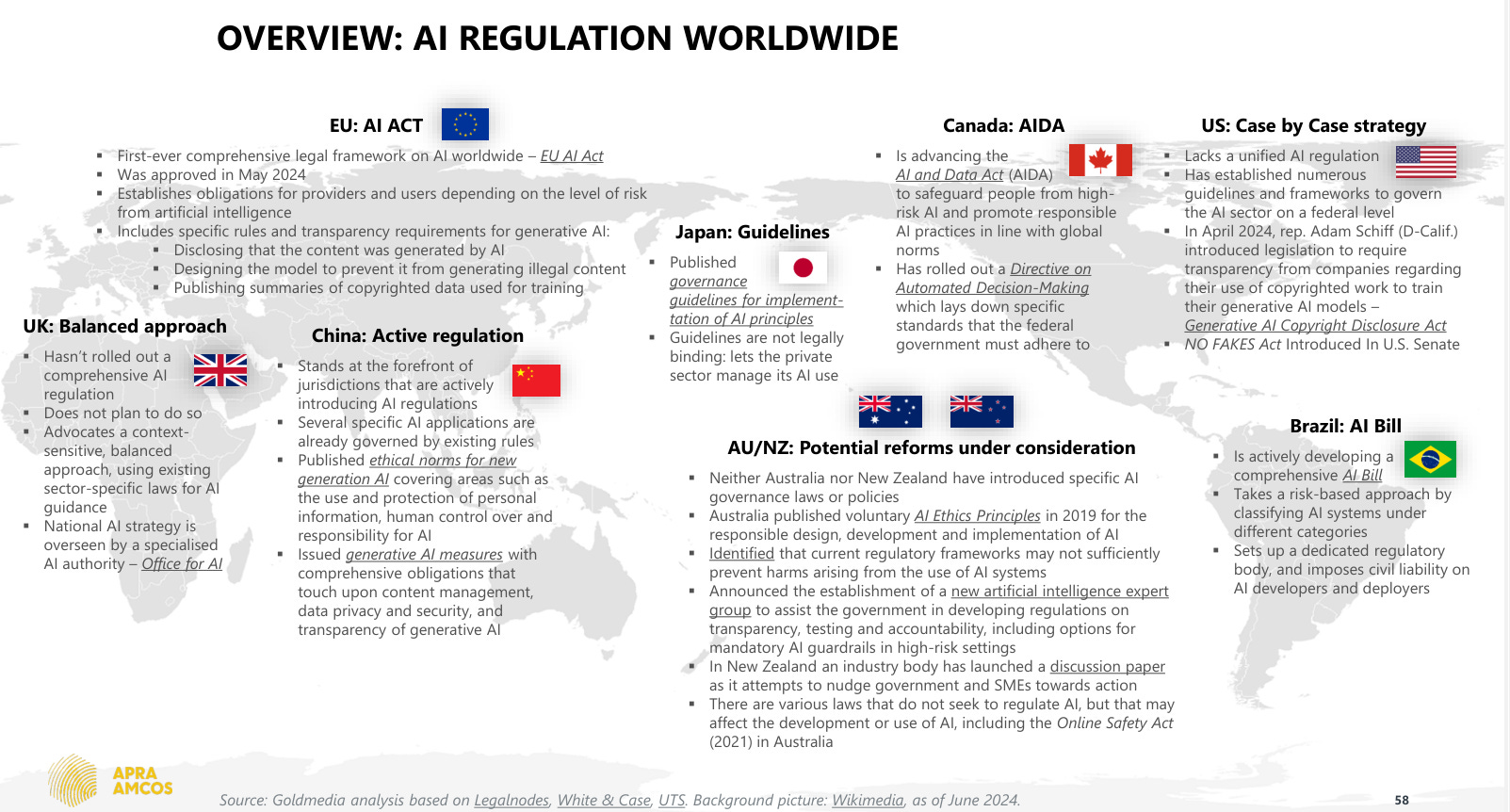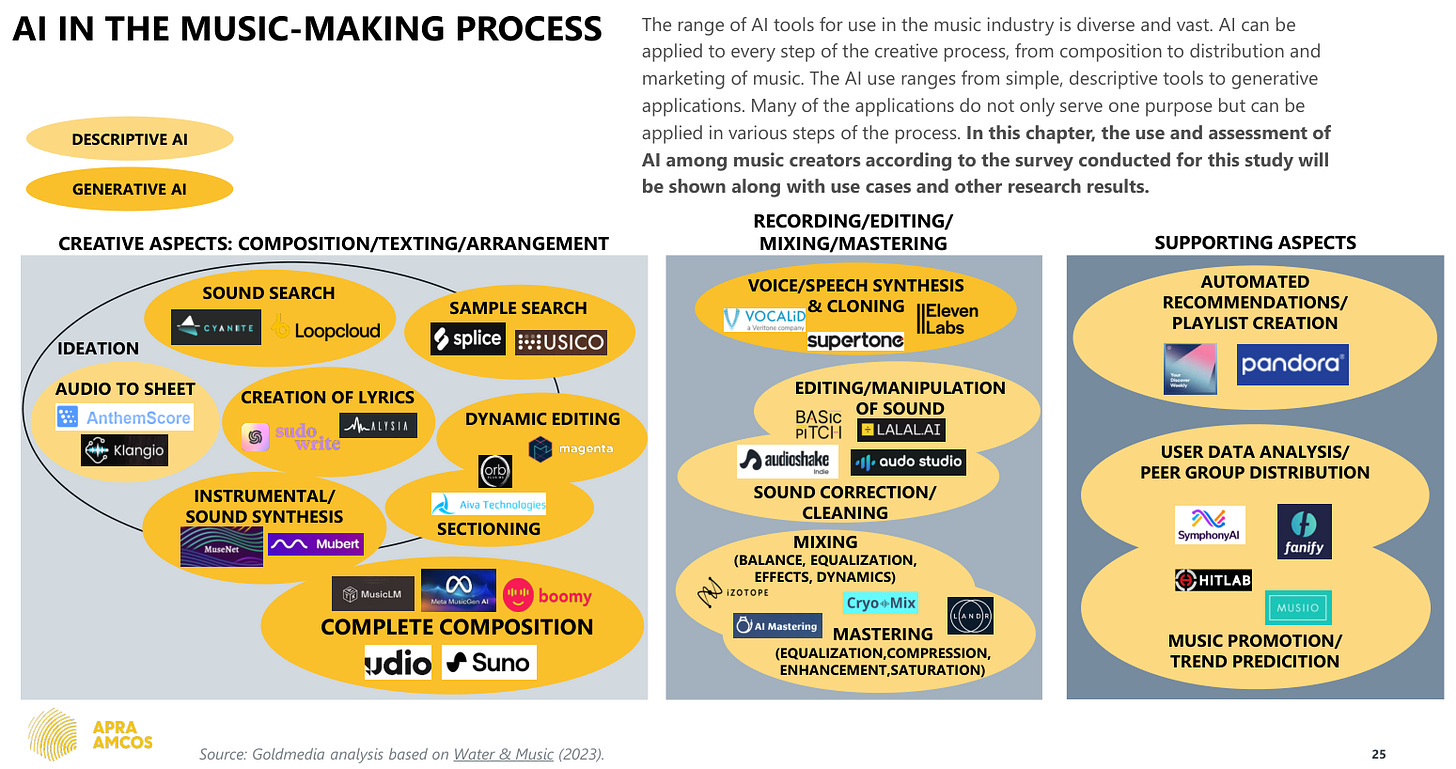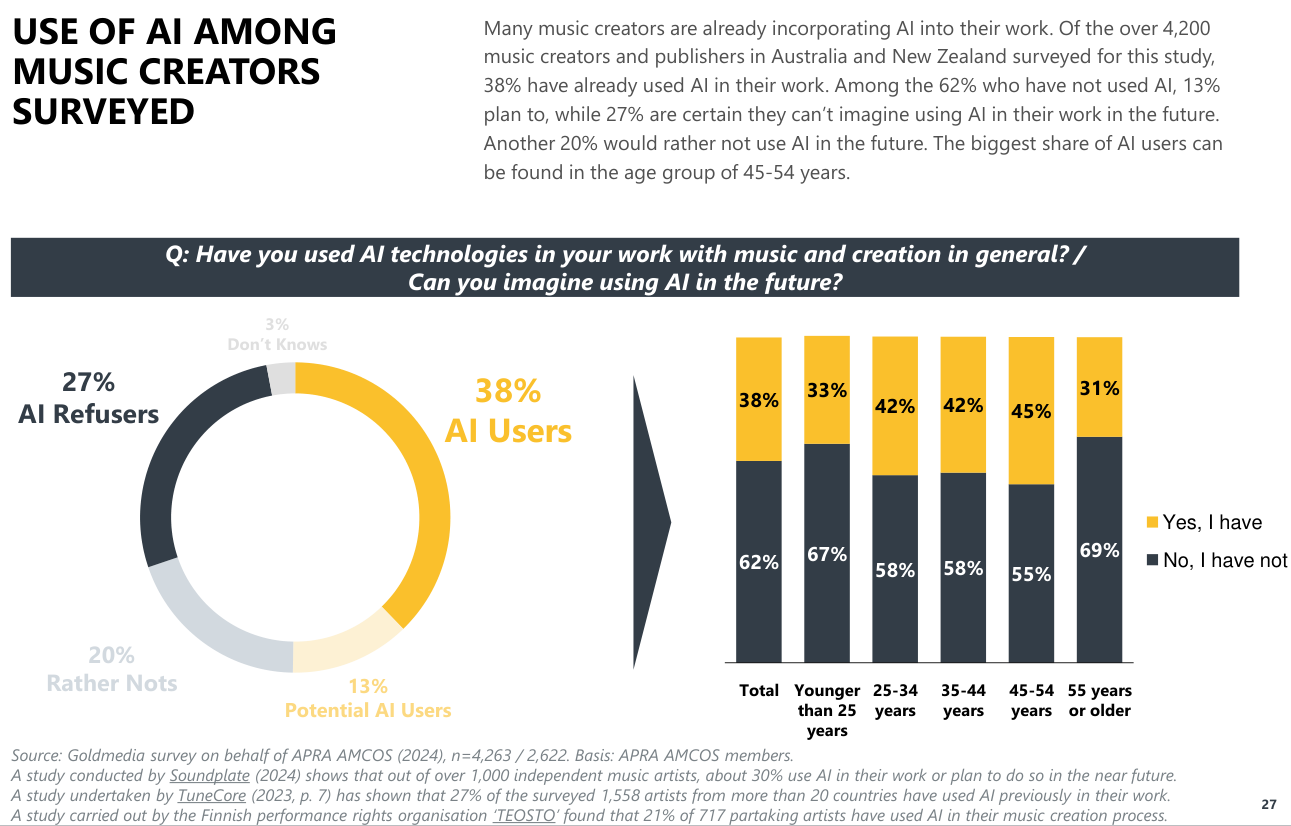Why are 65-71% of musicians afraid of AI?
A SACEM/GEMA study found that 35% of musicians are using AI and 71% fear it. There's overlap. A new study in Australia reports 38% use, 65% fear, and a concern about cultural appropriation.
There’s a great deal of chatter about musicians’ attitudes towards AI and the threats and opportunities AI presents for them. Here’s a quick summary of two recent studies covering France, Germany, Australia, and New Zealand about artists’ use and concerns about AI.
Organizations referenced in this article:
APRA AMCOS - collective venture for Australasian music, encompassing:
AMCOS = Australasian Mechanical Copyright Owners Society
APRA = Australasian Performing Right Association
GEMA = Gesellschaft für musikalische Aufführungs- und mechanische Vervielfältigungsrechte ("Society for musical performing and mechanical reproduction rights”) (Germany)
SACEM = Society of Authors, Composers and Publishers of Music (France)
See References and End Notes below for source links and for further details.
France and Germany
A joint study by SACEM and GEMA (French and German musicians’ associations) in late January 2024 explored sentiments around AI with their members.
Among many other findings (the report is 192 pages!), 35% of musicians in France and Germany are already using AI, while 19% refuse to use it and 26% say they would “rather not”.
11% see some opportunity in AI or think it will be about the same, while 64% see it as a risk to their livelihoods as music creators.

The report estimated that by 2028, the impact of AI will cost their members a cumulative income loss of ~2.7B euros. 1
Australia and New Zealand
A new study released in mid-August 2024 by Australian music rights organization APRA AMCOS reports artists sharing similar concerns about AI and music. The full report is 149 pages.
Among other findings, the study reported that 54% of artists surveyed agreed that AI could be helpful in the creative process, and 38% are already using AI in their work.
However, overall, 65% of music creators believed the “risks of AI could outweigh its possible opportunities and benefits.” 95% believe greater transparency and ethical behavior from AI companies is mandatory; they want companies to seek permission (consent), pay for data used to train its platforms (compensate), and disclose when they do so (credit).
The study found that their concerns are founded — as much as 23% of musicians’ revenue could be at risk by 2028. The report estimates that AI will “cost the local industry $519 million within the next three years”. 2 (NB: Money amounts are in AUD)
The study also identified a concern about the impact on indigenous populations. The report quotes Leah Flanagan, Director of the Aboriginal and Torres Strait Islander Music Office (NATSIMO): “The rise of AI technology poses significant threats to the cultural and economic wellbeing of all Indigenous communities. Due to the unique nature and cultural significance of Indigenous Cultural and Intellectual Property (ICIP), AI's effects on this vulnerable sector are profound.” The report also cited Dame Hinewehi Mohi DNZM, Manukura Puoro Māori/Director of Māori Membership, on the impact of AI on Māori peoples.
The survey reported that 89% of Aboriginal and Torres Strait Islanders who participated “felt AI would lead to an increase in cultural appropriation, with two-thirds (67 per cent) saying the technology made it harder to protect their cultural rights.” 76% of Māori people surveyed also agreed with this risk.
Note: The APRA AMCOS report cites many people in the industry, including Tracy Chan, the CEO of AI music company Splash Music (who just announced a few days ago 3 that they are now certified as Fairly Trained).
What’s Needed
Much of the discussion around impact on artists characterizes them as being stuck on the past, and suffering from an unwarranted fear of the unknown. Both of these studies substantiate that:
It isn’t that artists don’t see the potential value of AI. Musical artists are not stuck in the past; they are trying AI tools, with caution.
Musicians are right to be concerned about the impact on their livelihoods.
In the French and German study, 93% of creatives are adamant that politicians address the challenges of AI and copyright (93%), and want clear regulations on use of AI-generated content.
In the Australia and New Zealand study, 97 per cent of music creators involved in the report are demanding urgent government action and policies to regulate AI.
Page 58 of the APRA AMCOS study includes this nice overview of the world landscape of AI regulation. The report calls for actions and policies similar to the EU to be enacted in Australia and New Zealand.
All of our governments need to move forward and act quickly on these justifiable concerns to address all of the 3 (or 4) C’s for musicians: 4
Consent (and Control)
Credit (and transparency)
Compensation
If you’re interested in this topic (and you probably are if you’ve read this far!), I highly recommend reading the full APRA AMCOS study report (PDF here).
References
The SACEM/GEMA Study
SACEM website and on LinkedIn
GEMA website and on LinkedIn
The study (192pp): January 2024, https://www.gema.de/documents/d/guest/gema-sacem-goldmedia-ai-and-music-pdf
Condensed version: https://www.gema.de/documents/d/guest/gema_sacem_goldmedia_ai-and-music-key-facts-pdf
SACEM LinkedIn post: https://www.linkedin.com/posts/sacem_ai-and-music-sacem-gema-and-goldmedia-activity-7158108994794868736-B5lS/
The APRA AMCOS Study
The study (149 pages): August 2024, https://assets.apraamcos.com.au/images/PDFs/AI-and-Music-by-Goldmedia-for-APRA-AMCOS_FINAL.pdf
2024-08-19, APRA AMCOS press release on the study
Industry Articles
2024-01-30, “71% of musicians fear AI: study” (Business Times, Singapore)
2024-01-31, https://www.techtimes.com/articles/301181/20240131/musicians-worried-impact-ai-music-industry-new-study.htm
2024-01-31, https://musically.com/2024/01/31/gema-and-sacem-study-claims-ai-music-will-be-3bn-market-by-2028/
2024-08-13, https://www.music-hub.com/en-blog/the-revolution-of-generative-ai-music-opportunities-and-challenges
2024-08-20, https://limelight-arts.com.au/news/ai-and-our-music-industry-brace-for-impact/
2024-08-20, https://creativeindustriesnews.com/2024/08/apra-amcos-report-finds-23-of-music-creators-revenues-to-be-at-risk-by-2028-due-to-the-impact-of-generative-ai-models/ (has paywall)
End Notes
Some key findings of the SACEM/GEMA study: (PDF here)
Demands for transparency and regulation: 95% of creatives are demanding greater transparency from companies developing AI tools. They are also adamant that politicians address the challenges of AI and copyright (93%), and want clear regulations on use of AI-generated content.
Use of AI: 35% of creatives already use AI in their work. However, 64% view AI risks as exceeding the opportunities.
Expanding market: As of 2023, the music industry was ~8% of the total market for generative AI market, or ~$300M. By 2028, the market for generative AI in music is expected to grow to over $3B, at an annual growth rate ~60%.
Risks to creators: The study estimates that 27% of creators' income is at risk in the medium term. For members of SACEM and GEMA, by 2028 this could mean a cumulative income loss of ~2.7B euros (this number considers the expanding market). 71% of creatives are afraid that AI threatens their livelihoods.
Some notes on the APRA AMCOS study in Australia: (PDF here)
Key takeaways from the press release:
“Revenue risk: By 2028, 23% of music creators’ revenues will be at risk due to generative AI, an estimated cumulative total damage of over half a billion AUD$ (AUD$519 million)
AI adoption: Over half (54%) of those surveyed agree that AI technology can assist the human creative process, with AU and NZ songwriters and composers being early adopters
Income impact: 82% of music creators are concerned that the use of AI in music could lead to them no longer being able to make a living from their work
Cultural concerns: 89% of Aboriginal and Torres Strait Island music creators believe that AI will lead to an increase in cultural appropriation
Policy demands: 97% demand that policymakers should pay more attention to the challenges related to AI and copyright”
This figure (from page 16) shows the companies and areas of AI impact addressed in the study:
This figure from page 25 shows where they see these tools used in the creative process:
This figure from page 27 shows details on the musicians who are and aren’t using AI (it also cites a study indicating 21% of musicians in Finland are using AI):
This figure from page 30 shows details on music-related activities they are using AI for.
Credit for the 4 Cs (consent, control, credit, compensation) phrasing goes to the Algorithmic Justice League (led by Dr. Joy Buolamwini).
Credit for the original 3 Cs (consent, credit, and compensation) belongs to CIPRI (Cultural Intellectual Property Rights Initiative) for their “3Cs' Rule: Consent. Credit. Compensation©.”












